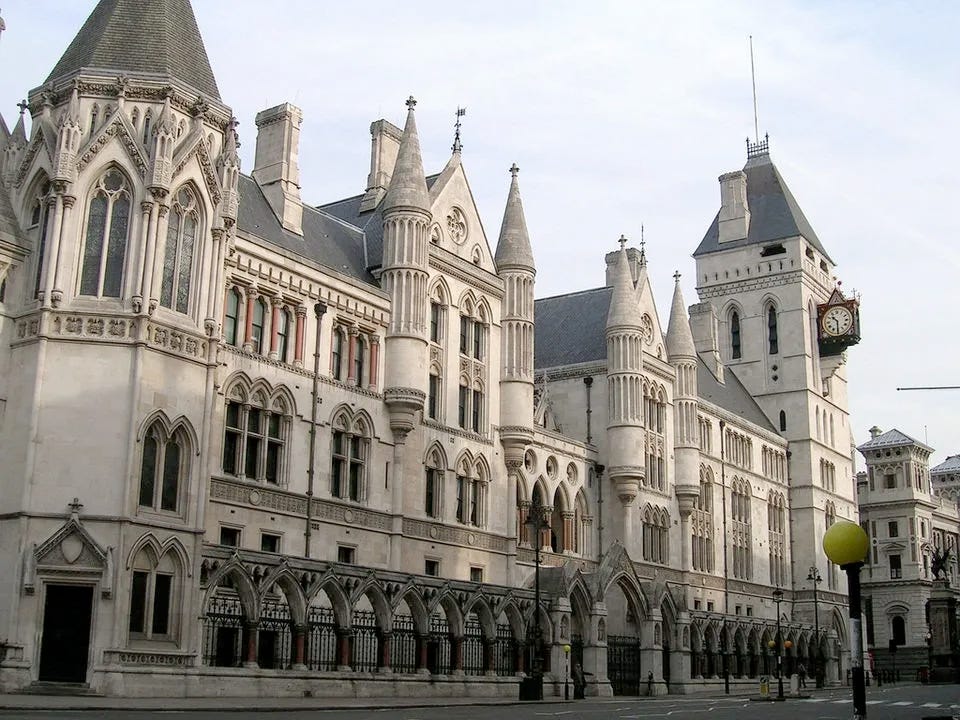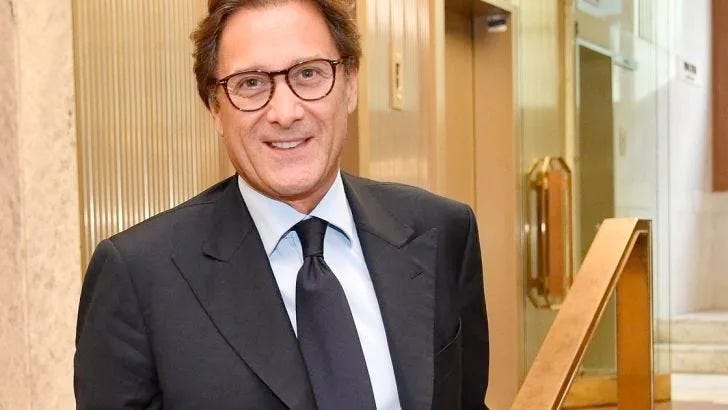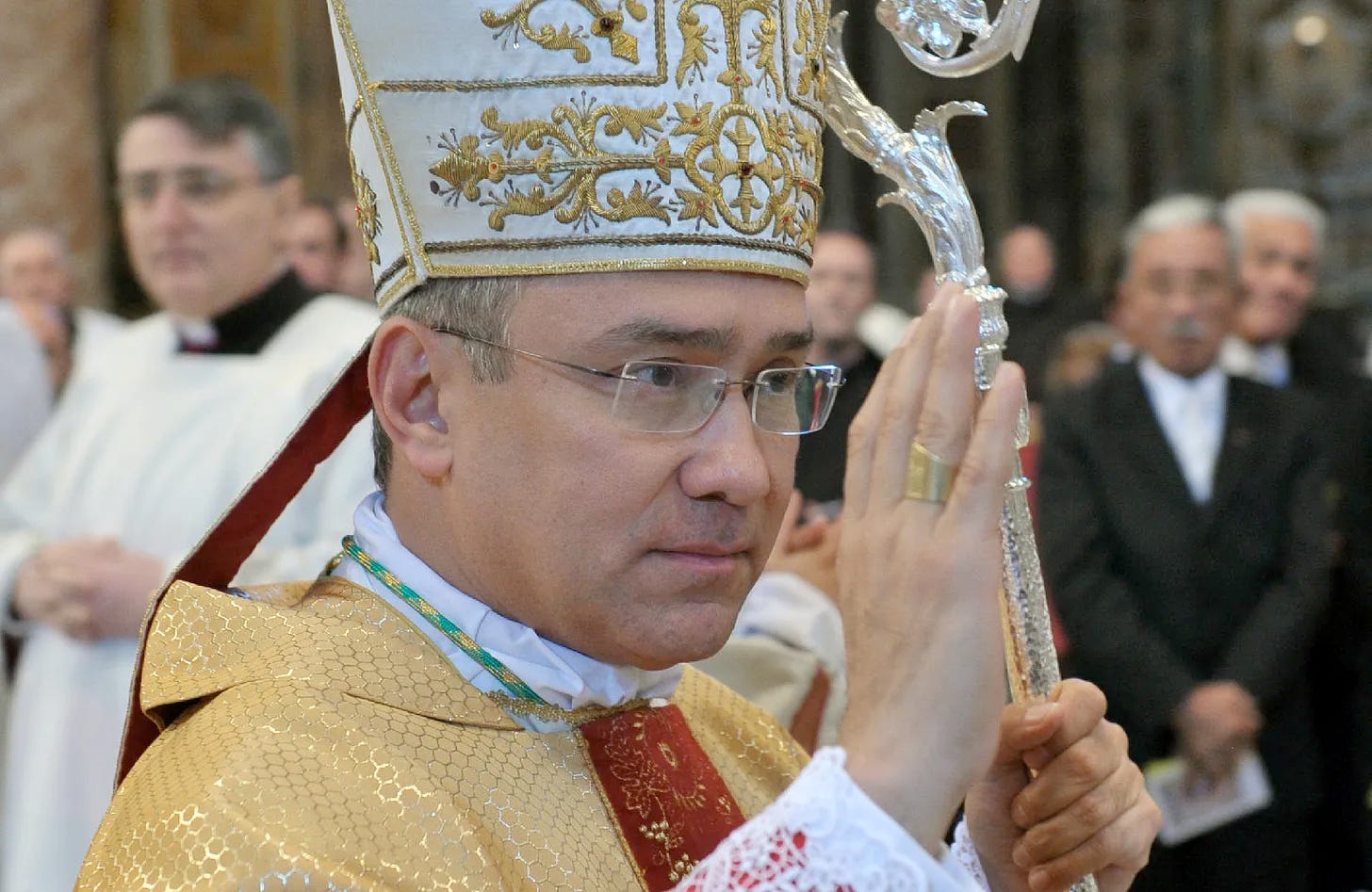Hearings began Wednesday in the High Court of England and Wales, in a lawsuit filed by Raffaele Mincione against the Secretariat of State, in which the investment manager is asking judges to rule he acted in “good faith” in his dealings with the Vatican.
As the trial gets under way, lawyers for the secretariat have complained that several material witnesses are “unavailable” to them, but confirmed that Archbishop Edgar Peña Parra, Vatican secretariat sostituto, will take the witness stand.
The suit, first filed by Mincione in 2020 while he was under criminal investigation in Vatican City, has taken years to come to trial, and follows his conviction for financial crimes by a Vatican court in December last year, in which he was sentenced to more than five years in prison and made party to a group asset forfeiture worth hundreds of millions of euros.
Mincione, who managed hundreds of millions of euros in Vatican funds from 2013 until 2018, is seeking declaratory relief from the court — a judicial ruling that he acted in “good faith” in his dealings with the secretariat.
That building, the acquisition of which triggered a years-long criminal investigation and trial in Vatican City, was subsequently sold by the Secretariat of State for a loss of more than 100 million euros.
The London court’s eventual decision in the case could prove a kind of international vote of confidence in the sprawling Vatican trial, in which appeal hearings are set to begin next month.
—
‘Good faith’ dealings
In a statement to media Wednesday, Raffaele Mincione said he was “delighted that these proceedings in England are finally underway,” and that he looked forward to seeing his dealings with the Vatican “examined by an independent and internationally-respected judicial system.”
Mincione has repeatedly questioned the probity of the Vatican City trial which saw his conviction last December, and has previously told The Pillar that was made a scapegoat for institutional incompetence and corruption within the Secretariat of State.
In an interview last November, Mincione also claimed that several offers to cooperate with the Vatican City public prosecutor’s office were rebuffed, and noted that he stood accused (and was eventually convicted of) “embezzling” Vatican funds by taking for investment monies which, under Vatican law, were unavailable for the purpose.
Mincione produced in court letters signed by successive Secretaries of State asserting the investment with him was legal under Vatican law. Vatican City prosecutors argued, successfully, that those assertions were the result of the cardinals receiving deliberately misleading advice from secretariat officials, including Cardinal Angelo Becciu.
Mincione filed the London lawsuit in June of 2020, the month in which Gianluigi Torzi, one of his alleged co conspirators to defraud the secretariat, was arrested in Vatican City and while a Vatican warrant for Mincione’s arrest was active.
That same month, official Vatican media branded Mincione’s management of Vatican money “speculative and self interested,” and Mincione filed suit in London seeking a judgment that he acted in “good faith” in his dealings with the secretariat, claiming that the Vatican was seeking to undo its deal with Mincione over the London property.
However, in defense arguments before the UK court, lawyers for the secretariat made clear that there was no such attempt to nullify the transaction. Instead, they noted, Mincione’s case had been fully litigated in Vatican City, where he has already been convicted.
According to lawyers for the Secretariat of State, London judges must consider not just the details of Mincione’s separation from Vatican investments in 2018 — which have resulted in numerous allegations and criminal charges of fraud against multiple parties — but the beginnings of the business relationship between the Vatican and Mincione, which go back to 2012.
In pressing the claim that he acted in “good faith,” Mincione told The Pillar last year that he had been approached in 2012 by another now convicted co-conspirator, Enrico Crasso, to shepherd an investment by the Secretariat of State in an Angolan oil company proposed by Cardinal Becciu.
According to Mincione, his company performed due diligence on the deal, concluded it was financially unworkable, and essentially aimed to walk away from the deal.
But lawyers for the Secretariat of State say otherwise.
They argue that after Crasso introduced Mincione to the Vatican, Mincione initially championed the soundness of the plan, both via his company and personally, and set up a fund through which to direct the secretariat’s investment of more than $200 million.
Only after the fund was created and the Vatican’s money on deposit with Mincione’s company, secretariat of lawyers argue, did Minionce’s view of the Angolan investment project change, with a new determination that the whole project was unviable.
Lawyers say it was something of a bait-and-switch.
“This was particularly tricky,” argued the secretariat’s lawyers, “because the vast majority of this money had been secured through lines of credit which needed to be serviced. It was around this time that [Mincione’s company] began presenting the ‘opportunity’ to invest in the [London] property to the Secretariat of State.”
The secretariat’s lawyers explain that to raise its $200 million stake with Mincione for the Angolan project the secretariat “borrowed money by taking credit lines from two banks (Credit Suisse and Banca Svizzera Italiana), with securities deposited as collateral.”
The Vatican’s lawyers contend that because the money came from high interest lines of credit, they had a compelling need to invest the money immediately following the collapse of the Angolan project — something both understood and effectively exploited by Mincione.
More broadly, that line of argument also represents a significant factual concession by the Secretariat of State.
Those reports were repeatedly denied by senior Vatican officials, including Cardinal Angelo Becciu, who called them “false,” “misleading,” and “shameful.”
Now, the Secretariat of State’s lawyers argue that the source of the Vatican’s investment funds was key to Minione’s ability to quickly redirect its investment into his own projects, including the London building.
The realistic market value of that property is another contested point in the lawsuit over Mincione’s “good faith.”
When the Secretariat of State diverted the whole of its 200 million stake with Mincione into other projects proposed by him, the cornerstone investment was the London building at 60 Sloane Ave.
The Vatican’s stake in the building was 45%, valued at 180 million euros: a sum more than Mincione paid for the entire building only two years earlier and nearly as much as the Vatican was able to realize when it eventually sold the whole building in 2021.
Mincione’s legal team argue that in between, and throughout his stewardship of the Vatican investment, the building’s worth was continually, independently re appraised and the secretariat’s stake was fair value in the booming London property market of the time.
Lawyers for the secretariat argue that there was “no justifiable basis” for the value as presented to the Vatican, and that Mincione’s companies “already had a track record of trying to arm-twist valuers or to obtain valuations which clearly had no sound basis.”
Mincione also used Vatican funds to invest in his other businesses and projects. He gave his businesses no-penalty loans, while at the same time charging the Vatican millions of euros in performance and management fees.
He told The Pillar last year that the bonds from his own company he had the Vatican buy were his way of getting the Vatican some financial return on the portion of the 200 million funds that he hadn’t allocated to other investment projects — back in 2013, Mincione pointed out, uninvested cash basically lost value, since interest rates were near zero and outpaced by inflation.
—
Lack of witnesses
Key to the Secretariat of State’s case, in which lawyers are urging judges not to grant Mincione’s requested declaration of his “good faith,” is that their lawyers are unable to call upon sufficient witnesses for the judges to reach a sound conclusion.
The lawyers argue that nearly anyone with first hand knowlegde about the situation has been convicted of fraud or other crimes.
“The main oral evidence which one might have expected to be given is not available to the Secretariat of State because the persons who would have been expecting to have given it were defrauding the Secretariat of State, either from inside or outside,” the Vatican’s lawyers argued in court submissions.
Specifically, the secretariat’s legal team describe as otherwise key material witnesses Cardinal Angelo Becciu, who as sostituto arranged and approved the whole investment with Mincione, Enrico Crasso, the banker and later investment manager for the secretariat, and Fabrizio Tirabassi, a layman working the secretariat’s administrative offices throughout the years in question. All three were convicted by a Vatican court of financial crimes and sentenced to lengthy prison terms.
Becciu, the Vatican’s lawyers further state, “is not available to the Secretariat of State and he is not regarded as a witness of truth, the same goes for Mr. Tirabassi.”
Instead, the secretariat’s lawyers argue that the sole material witness available to them is Archbishop Edgar Peña Parra, who succeeded Becciu as sostituto at the secretariat in 2018 and who ordered the immediate termination of the investment with Mincione.
The Vatican’s attorneys say that Peña Parra might be of limited value as a witness.
“He had just taken over his post at the time of the ‘transaction,’” the layers said, “and his knowledge of the lead up to it was limited.”
Despite that claim, Peña Parra is likely to face close questioning when he appears in court, with his testimony due to take place next week.
The archbishop has previously been scathing about the way in which his own department was run, while himself admitting in Vatican court to have ordered extra-legal retaliation against banking officials who refused to lend the secretariat large sums of money at favorable rates.
Peña Parra’s decision to terminate the secretariat’s investment with Minicone early resulted in massive contractual penalties for the Vatican, costing it millions.
Under the terms of the separation agreement, the Secretariat of State purchased the remaining share of the London building, gave up its remaining investment in Mincione’s Athena Global Opportunities Fund, paid an additional 40 million euros in penalties to Mincione through Athena, and assumed a 150 million euro mortgage on the property.
The building was later sold by the Vatican for a loss of more than 100 million euros.
Mincione previously told the Vatican court that the Secretariat of State understood the terms of the fund at the time it invested in it, that he had balanced the fund’s investment portfolio to minimize risk, and that the secretariat would have made money if it had abided by the initial terms of the deal.
Mincione has previously provided an independent auditors report he commissioned to examine his investments with the Vatican’s money.
That report, compiled by PwC, found that the Vatican stood to make money from Mincione’s management.
Interestingly, although the secretariat’s lawyers repeatedly referenced the central role of Msgr. Alberto Perlasca to the case, he is not slated to appear as a witness.
Perlasca served as Cardinal Becciu’s deputy throughout the sostituto’s term and the Vatican’s dealings with Mincione. Documents submitted in court, as well as lawyers for both sides, acknowledge perlasca’s key role in the secretariat’s financial dealings, with his being granted power of attorney to approve deals and move money on the Vatican’s behalf.
Perlasca was singled out for special criticism by Peña Parra in a memo submitted to the Vatican court, with the new sostituto describing his inherited deputy as responsible for blocking financial scrutiny of the department’s affairs, committing “serious errors” in record keeping, “unjustifiably inflating the value of the assets managed by the Secretariat of State” by nearly a third, and showed a clear pattern of approving contracts unreasonably favoring the secretariat’s outside partners over Vatican interests.
Despite this, Perlasca was neither sacked from his role nor prosecuted by Vatican authorities. Instead, he was transferred to the Vatican’s supreme canonical court, where he was named deputy prosecutor until 2020, when his offices were raided by Vatican police as part of the investigation into the financial crimes scandal.
After that raid, Perlasca became the Vatican prosecutors’ star witness, offering testimony against his former colleagues, including Becciu, and outside advisors to the secretariat like Crasso and Mincione.
Despite Perlasca’s role as key witness in the Vatican City trial, and despite his reappointment to a public Vatican legal office, lawyers for the secretariat told the London court that he cannot be called in the case.
Although he was “involved in the key events” of the case, was “investigated by the [Vatican prosecutors’ office] and indeed gave evidence in the Vatican,” the secretariat’s lawyers claimed, “he no longer works for the Secretariat of State and is not available to it.”
The supposed impossibility of calling a key witness to events, whose evidence was crucial in securing Mincione’s conviction in Vatican City, is expected to be vigorously contested by Mincione’s lawyers.
—
One big conspiracy
Similar to the Vatican prosecutors’ decision in the trial there, lawyers for the Secretariat of State in London are arguing that Mincione was a part of a coordinated, years-long effort by multiple parties to extract money out of the Vatican.
However, unlike in the Vatican trial, lawyers are not seeking to prove Mincione necessarily acted in a criminal or contractually illegal way. Rather, the secretariat’s legal team are asking judges to deny Mincione’s petition for a declaration that he acted in “good faith” in his dealings with the Vatican.
“Good faith,” the secretariat’s lawyers argued in their initial submission to the High Court, is not a term of art with a set legal definition, but English courts’ jurisprudence have set “certain expectations of the minimum requirements.”
To grant Mincione’s petition, they argued, they would have to find his conduct was, at least, consistent with the established “core values” of honesty and fair dealing. “Bad faith dealing need not necessarily be dishonest, but may be improper, commercially unacceptable, or improper.”
In addition to the circumstances surrounding the beginning of Mincione’s business dealings with the secretariat, the case will also focus on the eventual end of that relationship and how the Vatican came to own outright the London building.
Ownership of the building was conveyed through another businessman, Gianluigi Torzi, who was convicted of extorting and defrauding the Vatican.
Hired in 2018 by the Secretariat of State, under Archbishop Peña Parra, to manage its acquisition of the building at 60 Sloane Ave., Torzi structured the deal so that his Luxembourg-registered holding company would take ownership of the building, and he would then convey ownership of the holding company to the Vatican.
Instead, after taking ownership of the building, Torzi restructured the shares of the holding company, passing 30,000 ordinary shares to the Secretariat of State while retaining 3,000 preferential shares for himself that left him in total control of the company and therefore the building.
Prosecutors argued in Vatican court that Torzi extorted the Holy See for millions for possession of the controlling shares of the company — securing a Boxing Day papal audience for him and his family in the process.
The businessman has argued, through his lawyers, that his restructuring of the shares was approved by officials at the Secretariat of State, including Cardinal Pietro Parolin, and other secretariat officials tried to bribe, blackmail, and threaten him into giving them control of the building for their personal gain.
Judges in Vatican City assigned Torzi a sentence of six years in prison, in addition to damages.
Lawyers for the Secretariat of State in London argued Wednesday that “Torzi and Mincione were working together in their own interest with a view to extracting money from the Secretariat of State.”
“Its primary case is that involved a fraud on it,” they argued, “and misrepresentations made by Mr. Mincione. At the very lowest, that means that [Mincione and his companies], in particular Mr. Mincione, were not acting in good faith.”
The relationship and business dealings of Torzi and Mincione have been much discussed, both in Vatican court and in media reports.
Before Torzi was appointed by the Vatican to act as its broker in the London deal in 2018, Mincione borrowed tens of millions of euros from companies belonging to Torzi against the value of shares in an Italian bank, Banca Carige, in which Mincione is trying to acquire a controlling interest. Then takeover failed, the value of the shares collapsed, and with it the collateral for the loans from Torzi.
Mincione also invested the Vatican’s money in debt products marketed by Torzi, including in a bond involving a company with mafia links, and two Catholic hospitals under Italian fraud investigations.
According to Mincione, the whole business relationship came about after a chance meeting in a Milan restaurant at the end of 2017. He claims that Torzi was involved in a complicated plan to acquire control of the building, involving multiple other parties, but that Mincione was himself as much of a victim as the Secretariat of State.
Mincione has himself also filed a criminal complaint against Torzi with a Roman court, alleging fraud via a bond sold by Torzi which included securitized debts issued by facility management company Esperia SpA, which was ordered into forced liquidation for alleged ties to a Camorra mafia crime family in July 2018.
Mincione’s narrative of his dealings with Torzi, which spiraled in barely 10 months from a simple introduction in passing, to tens of millions of euros in bad investments, to both men being embroiled in the Vatican’s London property deal, will likely come under close scrutiny by the London court.
Key to the arguments for both sides will not be if Mincione and Torzi necessarily conspired with criminal intent to defraud the secretariat, or even if Mincione acted outside the requirements of his contract to manage the Vatican’s investments.
Rather, Mincione has asked the judges to consider his version of events and decide if he acted in “good faith.”







